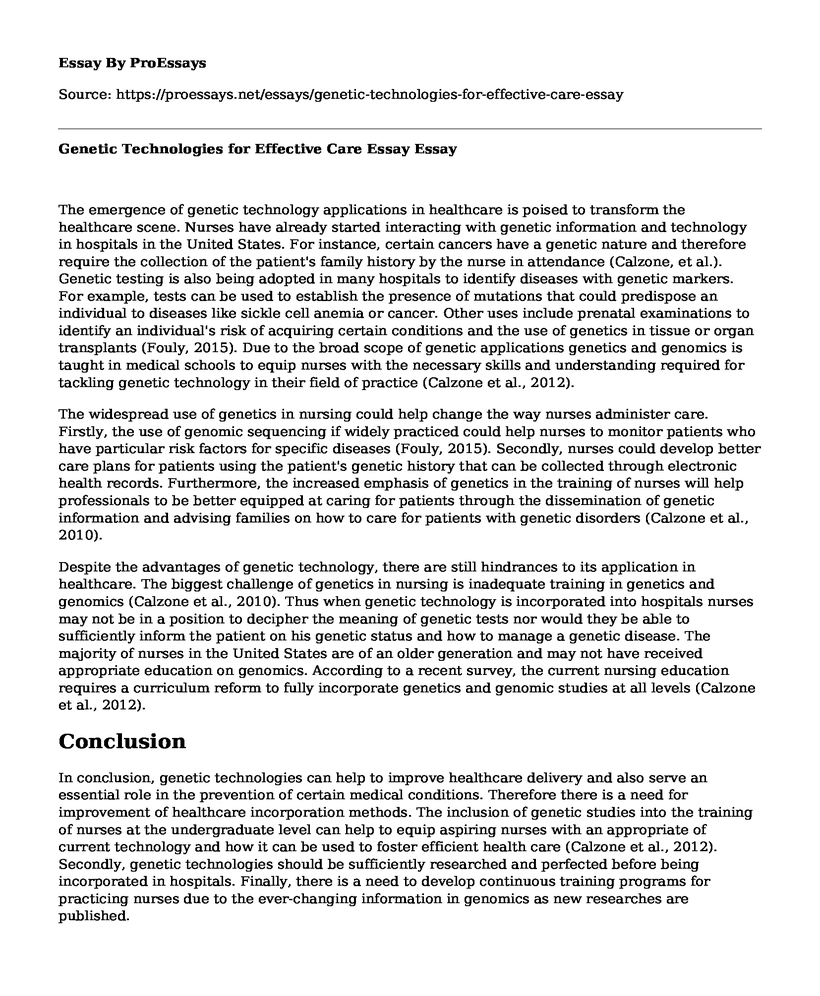The emergence of genetic technology applications in healthcare is poised to transform the healthcare scene. Nurses have already started interacting with genetic information and technology in hospitals in the United States. For instance, certain cancers have a genetic nature and therefore require the collection of the patient's family history by the nurse in attendance (Calzone, et al.). Genetic testing is also being adopted in many hospitals to identify diseases with genetic markers. For example, tests can be used to establish the presence of mutations that could predispose an individual to diseases like sickle cell anemia or cancer. Other uses include prenatal examinations to identify an individual's risk of acquiring certain conditions and the use of genetics in tissue or organ transplants (Fouly, 2015). Due to the broad scope of genetic applications genetics and genomics is taught in medical schools to equip nurses with the necessary skills and understanding required for tackling genetic technology in their field of practice (Calzone et al., 2012).
The widespread use of genetics in nursing could help change the way nurses administer care. Firstly, the use of genomic sequencing if widely practiced could help nurses to monitor patients who have particular risk factors for specific diseases (Fouly, 2015). Secondly, nurses could develop better care plans for patients using the patient's genetic history that can be collected through electronic health records. Furthermore, the increased emphasis of genetics in the training of nurses will help professionals to be better equipped at caring for patients through the dissemination of genetic information and advising families on how to care for patients with genetic disorders (Calzone et al., 2010).
Despite the advantages of genetic technology, there are still hindrances to its application in healthcare. The biggest challenge of genetics in nursing is inadequate training in genetics and genomics (Calzone et al., 2010). Thus when genetic technology is incorporated into hospitals nurses may not be in a position to decipher the meaning of genetic tests nor would they be able to sufficiently inform the patient on his genetic status and how to manage a genetic disease. The majority of nurses in the United States are of an older generation and may not have received appropriate education on genomics. According to a recent survey, the current nursing education requires a curriculum reform to fully incorporate genetics and genomic studies at all levels (Calzone et al., 2012).Conclusion
In conclusion, genetic technologies can help to improve healthcare delivery and also serve an essential role in the prevention of certain medical conditions. Therefore there is a need for improvement of healthcare incorporation methods. The inclusion of genetic studies into the training of nurses at the undergraduate level can help to equip aspiring nurses with an appropriate of current technology and how it can be used to foster efficient health care (Calzone et al., 2012). Secondly, genetic technologies should be sufficiently researched and perfected before being incorporated in hospitals. Finally, there is a need to develop continuous training programs for practicing nurses due to the ever-changing information in genomics as new researches are published.
References
Calzone, K. A., Cashion, A., Feetham, S., Jenkins, J., Prows, C. A., Williams, J. K., & Wung, S. (2010). Nurses transforming health care using genetics and genomics. Nursing Outlook, 58(1), 26-35. doi:10.1016/j.outlook.2009.05.001
Calzone, K. A., Jenkins, J., Yates, J., Cusack, G., Wallen, G. R., Liewehr, D. J., ... McBride, C. (2012). Survey of Nursing Integration of Genomics Into Nursing Practice. Journal of Nursing Scholarship, 44(4), 428-436. doi:10.1111/j.1547-5069.2012.01475.x
Fouly, H. A. (2015). The implications of evolving technology in nursing care. Retrieved from https://www.researchgate.net/profile/Howieda_Fouly/publication/276410589/inline/jsViewer/55b7971008aed621de046ed0inViewer=1&pdfJsDownload=1&origin=publication_detail&previewAsPdf=false
Mohmmed, R. G., Mohammed, H. M., & El-sol, A. E. (2017). New Technology in Nursing Education and Practice. IOSR Journal of Nursing and Health Science, 6(6), 29-38.
Cite this page
Genetic Technologies for Effective Care Essay. (2022, Mar 10). Retrieved from https://proessays.net/essays/genetic-technologies-for-effective-care-essay
If you are the original author of this essay and no longer wish to have it published on the ProEssays website, please click below to request its removal:
- The Gender Perspectives of Non-Profit Organization Leadership: Could Women Leadership Make More Committed Followers?
- Research Paper on Hypoglycemia
- Essay Example on Superior & Inferior Muscles of the Eye: Function & Movement
- Florence Nightingale: Pioneer of Modern Nursing & the Environmental Theory - Essay Sample
- The Gluteus Maximus: A Powerful Muscle for Upright Posture - Essay Sample
- Essay Sample on Computerization in Healthcare: A Revolution Since the 1960s
- Patient, Staff Safety in Psychiatric Hospitals: A Research Study - Essay Sample







